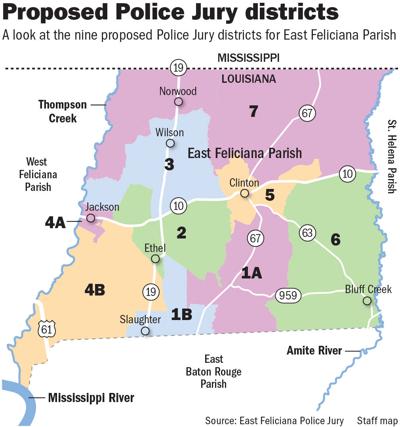Editor's note: This story has been updated with more details and information from a committee meeting.
Behind-the-scenes rumblings of a possible split of the two-parish Audubon Regional Library system bubbled to the surface during an April 19 East Feliciana Parish Police Jury meeting.
East Feliciana and St. Helena parishes participate in the regional library, with branches in Clinton, Jackson and Greensburg.
On another matter, the jury set a 5:30 p.m. May 2 public hearing on a proposed plan to revise the jury’s nine single-member districts for the 2023 elections, based on figures from the 2020 federal census.

The library discussion grew out of reports from Juror Richard Oliveaux, chairman of the jury’s Buildings and Properties Committee, who mentioned, in passing, the library’s plans to renovate an old Presbyterian church the former congregation donated to the parish for a library.
Several jurors said the Library Board, whose members are appointed by the two parish police juries, should involve the Police Jury in its plans to renovate the Clinton church.
That led Juror Chrissie O’Quin to say that East Feliciana should pull out of the arrangement and operate its own library, because the library board “is making poor decisions.”
Quoting Jackson resident Martin Macdiarmid, O’Quin said East Feliciana Parish puts up 83% of the library’s funding, while St. Helena contributes only 17%.
“We’re footing the bill for the other parish,” she said.
Macdiarmid said later that his figures come from the library system’s proposed 2022 budget, which is primarily supported by a 2.5-mill tax levied in both parishes.
He said he began looking into the library’s funding after the board voted to move the Jackson branch from the old Jackson school building to commercial property, with the monthly rent going from $350 to $1,800 in a 10-year lease.
Macdiarmid said the move came without any input from Jackson officials or the Police Jury.
He added that he attended one recent board meeting but was prohibited from asking a question because he did not fill out a form listing his question before the meeting began.
“How was I to know what question I might have before they met?” he asked, adding he was barred from entering another meeting because he was told it was closed to the public.
O’Quin said she witnessed the public being excluded from that meeting but entered it anyway.
Juror Chris Hall said the church building belongs to the Police Jury and the library board should include the jury in making plans for its use.
O’Quin said she plans to continue exploring how the jury would go about withdrawing from the two-parish compact, but former Parish Manager John Rouchon said jurors should first understand the cost of pulling out, making sure that other funding sources do not dry up because of the split.
The State Library helped form the regional library in the 1960s as it moved to have libraries established in each of Louisiana’s 64 parishes. West Feliciana Parish pulled out of the three-parish system after the River Bend nuclear power plant went on its property tax rolls in the 1990s.
The library came up again during an April 21 Building and Properties Committee meeting, although the three-member panel could not legally make recommendations. After adjournment, a group of residents urged the Police Jury to push for a decision on the old church’s future use.
Library Board member Faye Talbot said at least a “bare bones” renovation project is needed to get more space for library operations.
“We’ve had it for two years and haven’t done it,” Talbot said.
Jury President Louis Kent said the jury owns the building, but the Library Board has a 99-year lease on the property. He said any decision on whether the building should be renovated is for the board, not the jury, to make.
Procedures also came under attack on two fronts during the earlier Police Jury session, with Juror Ronald Johnson questioning who decided to strike Lane Lane from a plan to overlay it and a section of West Highland Lakeshore Drive.
O’Quin also questioned who authorized Oliveaux to go against a jury-approved “memorandum of understanding” that allotted space in the parish health unit building for a local drug and alcohol awareness organization.
Johnson and resident Kelvin Johnson berated the jury for ignoring a Feb. 21 vote to include Lane Lane in a first start of a possible road paving project.
At the urging of District 2 Juror Ed Brooks Sr. before his death in April 2020, the jury used a new machine to grind up the asphalt and base of Lane Lane as a test project. Jurors later agreed that the test did more harm than good to the road and promised to repair the damage, but the jury’s contractor did Haynes Lane, a street leading to the parish jail, instead of Lane Lane.
Although Johnson and Robinson did not get a clear answer on how the project evolved, jurors said several times that a larger road overlay project may not be possible this year.
“We just don’t have the money,” Public Works Chairman Jason McCray said.
O’Quin’s complaint about the health unit space resulted in Oliveaux calling the committee meeting two days later, where the committee voted on a plan to divide the empty health unit space between the Drug and Alcohol Awareness Council and parish coroner Dr. Dewitt Bickham.

